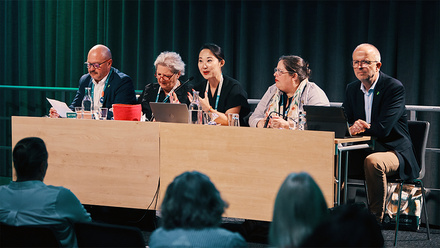Surveying the state of internationalisation in Israel

While states and employers are beginning to implement different exit strategies after months of lockdown, internationalisation processes in higher education remain largely disrupted and the mid- to long-term implications of the pandemic are difficult to assess.
Looking out of our home office windows in Israel, not only does spring fill the air, but also a curiosity for new innovative paths towards internationalisation. Study in Israel and the National Erasmus+ Office in Israel are seeking to learn from the lessons being revealed by the COVID-19 pandemic and engage in a collaborative discourse on how we can build on our foundations and continue to internationalise our higher education institutions in this new era.
Israel's international outlook
Although research in Israel has traditionally been very international, internationalisation in higher education is a relatively new field here, but one that is rapidly developing. The Council for Higher Education of Israel defined the internationalisation of the Israeli higher education system as a major goal in its multi-year strategy, garnering university support and dedicating resources to the subject. The motivation and overall objective of this national internationalisation policy is to increase the academic quality of the Israeli higher education system and promote Israel as a leading study destination for international talent.
Through this policy focus on internationalisation, we seek to make the Israeli academic environment more international by bringing in top students and researchers from all over the world, in order to develop international competency for Israeli students, increase ‘brain circulation’ and further academic and research collaboration. It is this quality-driven policy that shaped the new brand “Study in Israel – Engage in Excellence”. Through this initiative, the Council seeks to double the number of international students in Israel over the next five years, as well as increasing outgoing student mobility and academic collaborations.
Following the internationalisation process that this programme (together with the influential driving force of Erasmus+) facilitated, the majority of Israeli higher education institutions now consider internationalisation as one of their top five priorities. The institutions’ strategic approach is anchored in recently developed institutional strategies, echoing the national commitment to embed international activities in Israel's university sector as a cornerstone for excellence and development.
Engaged and optimistic professionals
Probably the most significant change seen over the last few years in Israel is the increased institutional capacity to design, manage and execute international activity (international partnerships, mobility agreements, international marketing, student support services etc), which is led by a growing group of professionals. In December 2019, the National Erasmus+ Office in Israel, in cooperation with the EAIE, held a comparative survey on the state of internationalisation in Israeli higher education institutions, based on the core questions of the EAIE Barometer and its results in the European Higher Education Area. The survey took place in the framework of an interactive session at the Israeli Erasmus+ information day, where in total 59 representatives of international relations offices responded (representing approximately 30 out of the 61 higher education institutions in Israel).
This study clearly showed some of the core characteristics of the Israeli situation. First, the internationalisation process in Israeli institutions is being managed by mid- and early-career professionals (82%), the majority of whom perceive their institutions as being average or below average in terms of internationalisation. That is to say, while a handful of academic institutions are very advanced in their international outreach, many of the mid-size and smaller institutions are in the early stages of internationalisation, and are eager to develop new pathways and partnerships at their institutions.
Of the Israeli professionals surveyed, 47% reported feeling positive and 43% stated that they were very positive about the future
In terms of organisation, 66% of respondents stated that they have a centralised approach to internationalisation and that, at the majority of institutions, no formal quality assurance mechanisms are in place to assess activities or measure impact of internationalisation. One of the distinct challenges relates to the perceived attractiveness of the Israeli higher education system to international students and partners – including perceived high living costs, international recognition etc.
Despite these challenges, Israeli professionals are very optimistic about the future of internationalisation in Israel. Of those surveyed, 47% reported feeling positive and 43% stated that they were very positive about the future! On the whole there appears to be a strong belief in the power of internationalisation and its potential to improve the quality of higher education and research in Israel.
We believe that this strong foundation, based on a strategic commitment to the values of internationalisation and driven by dynamic, optimistic professions, will give us the flexibility that is imperative for advancing internationalisation in our changing world.
Building on strong foundations
At this juncture, we seek to advance innovation in internationalisation based on a reflective process. The strategies and values that were defined in Israel and around the world will help us to develop new, innovative platforms and tools for furthering internationalisation. We must stick to our foundations, while remodeling our activities to remain relevant in this new era. In addition, we must reflect on the lessons learned during the pandemic and incorporate new ideas developed during this time into our practice. For example, how to utilise online learning to further Internationalisation at Home, how to make mobility programmes more flexible etc. All of this must be done while remaining impactful and quality driven. A key step to ensure this approach will be the development of institutional quality assurance mechanism that will be required of every institution in order to receive additional national funds for internationalisation.
The resources that our professionals currently use are more locally based: consulting with colleagues, the Erasmus+ Office, the national authority were the main answers in the survey we conducted. In order to substantiate the developing field, we believe that there is a real need to develop a professional community in Israel. This is a prime opportunity to work with the EAIE and colleagues from other countries to engage with communities of practice and foster the professional development of the field in Israel.
While uncertainty will continue to prevail for many more months to come, we hope to utilise this time for exchange and reflection in order to improve the quality of international activity in Israel. This is an opportunity for us to begin a discourse around common challenges and become part of the larger international community working to bolster higher education in a global world.






